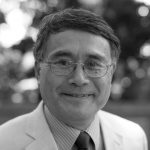
Sebastian Chang Hwan Kim is the Robert Wiley Professor of Renewal in Public Life and academic dean for Fuller’s Korean Center, which aims to support the formation of Korean Christian leaders through Korean-language degree programs for the ministry and mission of Korean churches in Korea, in the US, and in other parts of the world.
Katie Shinn: Can you speak to the cultural and intercultural dynamics of Korean leaders and ministers, in particular, being trained by Western institutions outside of their local contexts? For example, what advantages are there of studying at Fuller’s Korean Center for ministry leaders, pastors, and missionaries around the world?
Sebastian Kim: Education in Korea provides a world-class, high-quality educational environment. Korean universities continue to be globally competitive with their excellent faculty, competitive students, exceptional libraries and facilities, and enthusiasm for higher education. I believe this is true of most Korean seminaries as well. However, education in Korea tends to follow traditional learning methods within the Korean culture. Seminaries, for the most part, are affiliated with a denomination. Education and ministry in such an environment are often limited to the church’s policies and doctrines. Fuller provides a valuable experience in this regard. Many of our graduates often express that while studying at Fuller, meeting and interacting with people from various denominational backgrounds was a very valuable experience for their ministries. Those who work as missionaries have also said they broadened their perspectives in the field thanks to the various interpretations and approaches to missions that they were introduced to at Fuller. Personally, I can say that completing my master’s degree at Fuller 27 years ago, before going to India as a missionary, was a great step forward, not only in my missionary work in India but also as a lifelong missionary and seminary professor. Fuller, with its main campus in Pasadena, is proud to be a seminary that always embraces the world, faces the world, ponders and studies world interests, and harmonizes regional diversity and global relevance.
KS: Inversely, do you think we are approaching a time when those in the West can similarly be influenced and impacted by the Korean Church? In what ways have you already seen this impact?
SK: Yes, that’s an important question. For a long time, there has been a discussion about the ministry partnership between Western churches and non-Western churches. The Korean church has long been contributing to the world church as a partner, not just a recipient. In the evangelical and ecumenical mission movements, the distinction between “the sending country” and “the receiving country” is gradually disappearing, and the concept of “mission in six continents” is accepted by most of us. This ideal, however, is not fully implemented in missions today. Although there is considerable participation and activity in leadership from the non-Western world at international mission conferences and Christian international organizations, missionary activities are still carried out in such a way that mainly churches in the Northern Hemisphere send funds and missionaries to the Southern Hemisphere.
This issue is theologically important as we affirm that the global church is the biblical image of God’s family and the body of Christ. Therefore, we share what we have with others, including financial resources, workforces, and experience. For this to work, both the Northern and Southern Hemisphere churches must have an attitude of learning and accepting help from each other. In Christ, God has given gifts without partiality to all areas of the body of Christ, so we must both acknowledge that we need each other to experience the full expression of the body, of which Christ is the head. Furthermore, we need to respect each other’s limitations and difficulties, strive to build each other up, and respond sensitively and willingly to the needs of the other. As a result, mission and church cooperation will be seen as a two-way road of continuous exchanges and learning, with the understanding that there are reciprocal benefits.
The Korean church is a church that has grown through hardships and has achieved growth with an emphasis on self-reliance. It is also a church with a serious passion for mission, sending missionaries all over the world. Such spirituality, passion, and faithfulness are valuable assets that we can share with the world church. Despite its many weaknesses and shortcomings, the Korean church should share these attributes with the world church to form a true household of God.
KS: You have lived in a broad range of cultural contexts, in different countries and continents—Korea, the UK, India, and the US. With these changes in the world, along with globalization on the rise, how do you see the church forming its leaders in a more interconnected world?

Sebastian Chang Hwan Kim is the Robert Wiley Professor of Renewal in Public Life and academic dean for Fuller’s Korean Center, which aims to support the formation of Korean Christian leaders through Korean-language degree programs for the ministry and mission of Korean churches in Korea, in the US, and in other parts of the world.
Katie Shinn is an MA in Intercultural Studies student and is the Fuller Student Council representative for the Korean Center.
Sebastian Chang Hwan Kim is the Robert Wiley Professor of Renewal in Public Life and academic dean for Fuller’s Korean Center, which aims to support the formation of Korean Christian leaders through Korean-language degree programs for the ministry and mission of Korean churches in Korea, in the US, and in other parts of the world.
Katie Shinn: Can you speak to the cultural and intercultural dynamics of Korean leaders and ministers, in particular, being trained by Western institutions outside of their local contexts? For example, what advantages are there of studying at Fuller’s Korean Center for ministry leaders, pastors, and missionaries around the world?
Sebastian Kim: Education in Korea provides a world-class, high-quality educational environment. Korean universities continue to be globally competitive with their excellent faculty, competitive students, exceptional libraries and facilities, and enthusiasm for higher education. I believe this is true of most Korean seminaries as well. However, education in Korea tends to follow traditional learning methods within the Korean culture. Seminaries, for the most part, are affiliated with a denomination. Education and ministry in such an environment are often limited to the church’s policies and doctrines. Fuller provides a valuable experience in this regard. Many of our graduates often express that while studying at Fuller, meeting and interacting with people from various denominational backgrounds was a very valuable experience for their ministries. Those who work as missionaries have also said they broadened their perspectives in the field thanks to the various interpretations and approaches to missions that they were introduced to at Fuller. Personally, I can say that completing my master’s degree at Fuller 27 years ago, before going to India as a missionary, was a great step forward, not only in my missionary work in India but also as a lifelong missionary and seminary professor. Fuller, with its main campus in Pasadena, is proud to be a seminary that always embraces the world, faces the world, ponders and studies world interests, and harmonizes regional diversity and global relevance.
KS: Inversely, do you think we are approaching a time when those in the West can similarly be influenced and impacted by the Korean Church? In what ways have you already seen this impact?
SK: Yes, that’s an important question. For a long time, there has been a discussion about the ministry partnership between Western churches and non-Western churches. The Korean church has long been contributing to the world church as a partner, not just a recipient. In the evangelical and ecumenical mission movements, the distinction between “the sending country” and “the receiving country” is gradually disappearing, and the concept of “mission in six continents” is accepted by most of us. This ideal, however, is not fully implemented in missions today. Although there is considerable participation and activity in leadership from the non-Western world at international mission conferences and Christian international organizations, missionary activities are still carried out in such a way that mainly churches in the Northern Hemisphere send funds and missionaries to the Southern Hemisphere.
This issue is theologically important as we affirm that the global church is the biblical image of God’s family and the body of Christ. Therefore, we share what we have with others, including financial resources, workforces, and experience. For this to work, both the Northern and Southern Hemisphere churches must have an attitude of learning and accepting help from each other. In Christ, God has given gifts without partiality to all areas of the body of Christ, so we must both acknowledge that we need each other to experience the full expression of the body, of which Christ is the head. Furthermore, we need to respect each other’s limitations and difficulties, strive to build each other up, and respond sensitively and willingly to the needs of the other. As a result, mission and church cooperation will be seen as a two-way road of continuous exchanges and learning, with the understanding that there are reciprocal benefits.
The Korean church is a church that has grown through hardships and has achieved growth with an emphasis on self-reliance. It is also a church with a serious passion for mission, sending missionaries all over the world. Such spirituality, passion, and faithfulness are valuable assets that we can share with the world church. Despite its many weaknesses and shortcomings, the Korean church should share these attributes with the world church to form a true household of God.
KS: You have lived in a broad range of cultural contexts, in different countries and continents—Korea, the UK, India, and the US. With these changes in the world, along with globalization on the rise, how do you see the church forming its leaders in a more interconnected world?
Sebastian Chang Hwan Kim is the Robert Wiley Professor of Renewal in Public Life and academic dean for Fuller’s Korean Center, which aims to support the formation of Korean Christian leaders through Korean-language degree programs for the ministry and mission of Korean churches in Korea, in the US, and in other parts of the world.
Katie Shinn is an MA in Intercultural Studies student and is the Fuller Student Council representative for the Korean Center.
SK: From the second half of the 20th century to the 21st century, I believe that the most encouraging development in the church and mission is the awareness and the study of world Christianity. Previously, all countries except European and North American ones were regarded as missionary destinations, and Western church traditions were continued in each one. The reality was that all fields of theology unilaterally followed the Western traditions. Today, however, world Christianity has established itself as an important theological subject through the unique forms of worship and missions. It continues to establish the church tradition with original theology in each region. Furthermore, the theology and ecclesial traditions of these regional churches in Asia, Africa, and South America greatly influence the theology and missions of the Western church, inclusive of all aspects of the church.
Despite these changes, world Christianity still tends to depend on the theology, ecclesial traditions, and finances of the Western church. Churches in Africa, South America, and Asia have grown significantly in quantity and are making great contributions to world missions. However, it is not an exaggeration to say that the worldview and theology of these churches still maintain the Western-centered thinking of the past. The perception that Christianity is a Western religion is deeply entrenched not only among non-Christians but also among Christians. To overcome this perception, theological education should not only understand the trends of Christianity around the world but also study and understand that Christianity has developed various traditions, histories, and theologies in each continent and country in its own unique ways—and that they are in complementary harmony with each other.

KS: What hopes do you have for the relationships between communities of the church across the Pacific and around the world? What roadblocks do you think will need to be overcome? What encouragement might you give?
SK: It is necessary for churches around the world to become closer, to identify commonalities with each other, to form a diverse and inclusive community as the body of Christ, and to work closely together. Cooperation between denominations, between missionary groups, and through organizations such as the World Evangelical Alliance, the Lausanne Movement, and the World Council of Churches is also encouraging. In my opinion, the biggest obstacle that the church needs to overcome is the problem of dichotomy or polarization. This is the distinction between the sacred and the secular, the distinction between the inside and the outside of the church, the simple conceptual distinction between good and evil, right and wrong, and the inequality between the rich and the weak and the poor. Because many of the topics discussed in theology have developed within the church and into disciplines that can be understood only on the premise of faith, the church has mainly dealt with spiritual matters. When the church turns its back on social justice and the problems that people are worried about, it loses credibility and influence in the world.
What is important is that in addressing these concerns and questions, the church should always keep in mind the public nature of the society that it belongs to. This means that the church should not just remain as a community of faith or a religious institution, but it should take on a public identity and mission and pursue the common good. From the perspective of the kingdom of God, the church participates in the public realm based on the model of the Triune God, which is deeply rooted in the fundamental identity and role of the church, not just in its ancillary activities. The church is distinguished from the world, of course, but it is not separate from the world. It confirms its identity and mission through its relationship with the world, and for this, theology and missiology must continue to serve the church, and at the same time, constantly seek to relate the world and the church.
Faculty and alumni of Fuller’s Brehm Center discuss the role of worship and the arts in the church, common misconceptions many may have about the church and culture, and the hope-filled shifts they are witnessing.